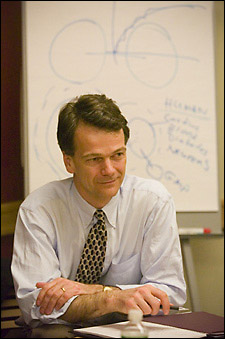Two science initiative appointments announced
Reeve and Clark will lead HCSI and IIC, respectively

Harvard Provost Steven E. Hyman has announced appointments that carry two University cross-disciplinary science initiatives to the next level of their development:
Brock Reeve, former COO of Life Science Insights and a Harvard Business School graduate with extensive experience at the intersection of business and the life sciences, has been named executive director of the Harvard Stem Cell Institute (HSCI); and Tim Clark, director of the Center for Interdisciplinary Informatics at the MassGeneral Institute for Neurodegenerative Disease and an instructor in neurology at Harvard Medical School, has been named director of research programs at the Harvard Initiative in Innovative Computing (IIC).
“We expect these appointments to serve as a model for our other major science initiatives,” Hyman said. “In Brock and Tim we have two leaders with a breadth of experience that cuts across the array of disciplines and tasks that need to be mastered to provide real administrative leadership for these programs.”
As executive director of HSCI, Reeve will direct all of HSCI’s nonscientific operations and planning, working not only with the institute’s faculty, but also with the leadership of the Harvard-affiliated hospitals – where many HSCI researchers are based – but also with donors and with his peers in the pharmaceutical industry.
“Brock has the precise skill set, experience, and dedication to the mission necessary to take HSCI to the next level and beyond. We are excited to have him at the helm of the institute’s operational side,” said Douglas Melton, HSCI co-director and the Thomas Dudley Cabot Professor of the Natural Sciences.
And Co-Director David Scadden, professor of medicine and director of the Center for Regenerative Medicine at Massachusetts General Hospital, added, “Brock gives us someone with a sense of strategic vision. It was immediately apparent in our initial discussions with him that he’s drawn to our larger goals”.
As the brother of the late actor Christopher Reeve, who suffered a paralyzing spinal cord injury and launched a foundation to advance research in that area; as the brother-in-law of the late Dana Reeve, who died recently of lung cancer; and as the son-in-law of a Parkinson’s sufferer, Reeve approaches his work on a very personal level. “I don’t view this as just a ‘job,’” he said. “I view it as a very personal commitment.”
Clark’s commitment to the work of the Harvard Initiative in Innovative Computing is less personal than it is intellectual and academic: He was one of the three authors of the 2004 white paper that laid out the raison d’être for the establishment of the institute.
“Theory and experiment are two sides of the scientific endeavor,” said Clark, a joint recipient of the 2003 BioIT World Grand Prize for Best Practices in Pharma R&D Informatics – “and computation today represents the third side of the triangle. This is such a rich, rich intellectual community, and provides enormous opportunity for true collaborative efforts between computational scientists and investigators in other sciences, from astronomy, to stem cells, to neuroscience.”
The former vice president for informatics at Millennium Pharmaceuticals, “Tim provides us with the perfect mix of experience in academia and industry,” said Alyssa Goodman, IIC director and a professor of astronomy. “He understands that true collaboration is central to all we hope to accomplish at the institute, and having helped lay the IIC’s foundation, is uniquely positioned to oversee our research program.”




